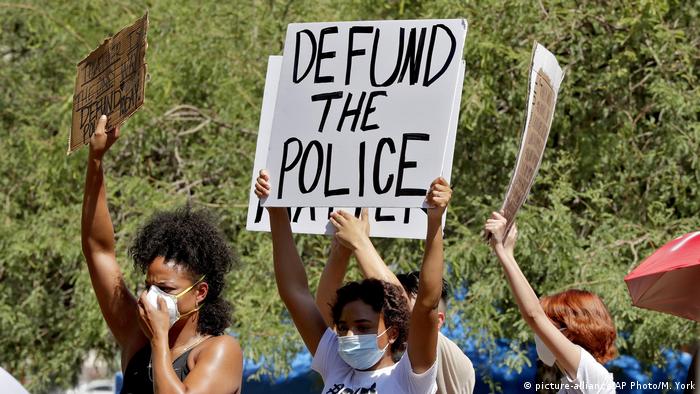It’s possible that I shall make an ass of myself. But in that case one can always get out of it with a little dialectic. I have, of course, so worded my proposition as to be right either way (K.Marx, Letter to F.Engels on the Indian Mutiny)
Sunday, June 07, 2020
French police under investigation for leaked racist comments
Issued on: 06/06/2020 -

Issued on: 06/06/2020 -

Leaked contents from a private Facebook group for French police officers, published by the online media outlet StreetPress. © Facebook (screen grabs via StreetPress)
Leaked comments from a private Facebook group for police officers have fuelled outrage over racism among French law enforcement, prompting Paris prosecutors to open an investigation on Friday.
Even as Black Lives Matter protests have swelled in France along with those taking place around the world, online media outlet SteetPress published contents on Thursday from a private Facebook group reserved for police officers.
Members of the group repeatedly used racist and sexist terms, even mocking victims of police brutality.
“If the facts are proven to be true, these comments are unacceptable and seriously damage the honour of the police,” said Interior Minister Christophe Castaner.
Castaner pledged on Wednesday that “every mistake, every excess, every word including racist expressions” by police would be “the subject of an investigation, a decision, a punishment”.
Paris prosecutors opened an investigation on Friday.
In a separate case, a black police officer filed a complaint against six white colleagues in December 2019 after discovering an abundance of racist messages on a private WhatsApp group, often concerning him.
The officers involved will face a disciplinary hearing, national police chief Frédéric Veaux told AFP on Thursday.
"The French police isn't racist," he said. "It suffers from behaviour which in no way corresponds to the republican values it defends."
Government officials say incidents of racism are the deplorable actions of individuals whereas critics say there is a systemic problem.
Protests banned
Protesters gathered late Saturday afternoon near the Eiffel Tower in Paris using the slogans, "Let us breathe" and "No justice, no peace", echoing the words used since George Floyd's May 25 death sparked demonstrations across the US.
Leaked comments from a private Facebook group for police officers have fuelled outrage over racism among French law enforcement, prompting Paris prosecutors to open an investigation on Friday.
Even as Black Lives Matter protests have swelled in France along with those taking place around the world, online media outlet SteetPress published contents on Thursday from a private Facebook group reserved for police officers.
Members of the group repeatedly used racist and sexist terms, even mocking victims of police brutality.
“If the facts are proven to be true, these comments are unacceptable and seriously damage the honour of the police,” said Interior Minister Christophe Castaner.
Castaner pledged on Wednesday that “every mistake, every excess, every word including racist expressions” by police would be “the subject of an investigation, a decision, a punishment”.
Paris prosecutors opened an investigation on Friday.
In a separate case, a black police officer filed a complaint against six white colleagues in December 2019 after discovering an abundance of racist messages on a private WhatsApp group, often concerning him.
The officers involved will face a disciplinary hearing, national police chief Frédéric Veaux told AFP on Thursday.
"The French police isn't racist," he said. "It suffers from behaviour which in no way corresponds to the republican values it defends."
Government officials say incidents of racism are the deplorable actions of individuals whereas critics say there is a systemic problem.
Protests banned
Protesters gathered late Saturday afternoon near the Eiffel Tower in Paris using the slogans, "Let us breathe" and "No justice, no peace", echoing the words used since George Floyd's May 25 death sparked demonstrations across the US.
This chant: “police partout justice nulle part”= police everywhere, justice nowhere
Lots of #BlackLivesMatter and #JusticePourAdama placards pic.twitter.com/3cgOdtJ0fb— Catherine Nicholson (@ACatInParis) June 6, 2020
French authorities had tried to ban an earlier demonstration against police brutality Saturday in front of the US embassy in Paris, citing a coronavirus restriction on gatherings of more than 10 people. That demonstration went ahead despite the ban.
Calls for new demonstrations in France followed a tense 20,000-strong rally in Paris on Tuesday to commemorate the death of black 24-year-old Adama Traoré, who died in police custody in 2016. His death has long been a rallying cry for critics of the French police.
His case contains sad parallels to the George Floyd case. Traoré ran from the police during a dispute over an identity check before being apprehended. He died after he was pinned to the ground under the combined body weight of three arresting officers, according to the testimony of one of them.
Last Friday, French medical experts said Traoré did not die of "positional suffocation", ruling out that the officers pinning him to the ground were the cause of his death.
But on Tuesday, a new probe commissioned by the Traoré family said his death was caused by the arrest technique used.
Several thousand youths dressed in black gathered in the eastern city of Strasbourg on Friday night to remember Floyd, an AFP journalist said. "The real virus is racism," they chanted, with many holding placards copying US slogans such as "Black Lives Matter".
There have also been calls for demonstrations in Marseille, Bordeaux, Lille, Nantes and Metz to go ahead on Saturday.
(FRANCE 24 with AFP)
Lots of #BlackLivesMatter and #JusticePourAdama placards pic.twitter.com/3cgOdtJ0fb— Catherine Nicholson (@ACatInParis) June 6, 2020
French authorities had tried to ban an earlier demonstration against police brutality Saturday in front of the US embassy in Paris, citing a coronavirus restriction on gatherings of more than 10 people. That demonstration went ahead despite the ban.
Calls for new demonstrations in France followed a tense 20,000-strong rally in Paris on Tuesday to commemorate the death of black 24-year-old Adama Traoré, who died in police custody in 2016. His death has long been a rallying cry for critics of the French police.
His case contains sad parallels to the George Floyd case. Traoré ran from the police during a dispute over an identity check before being apprehended. He died after he was pinned to the ground under the combined body weight of three arresting officers, according to the testimony of one of them.
Last Friday, French medical experts said Traoré did not die of "positional suffocation", ruling out that the officers pinning him to the ground were the cause of his death.
But on Tuesday, a new probe commissioned by the Traoré family said his death was caused by the arrest technique used.
Several thousand youths dressed in black gathered in the eastern city of Strasbourg on Friday night to remember Floyd, an AFP journalist said. "The real virus is racism," they chanted, with many holding placards copying US slogans such as "Black Lives Matter".
There have also been calls for demonstrations in Marseille, Bordeaux, Lille, Nantes and Metz to go ahead on Saturday.
(FRANCE 24 with AFP)
Video: Big crowd at Eiffel Tower for peaceful Paris march against racial discrimination and police violence
Protesters poured into the streets of the Lebanese capital Saturday to decry the collapse of the economy, as clashes erupted between supporters and opponents of the Iran-backed Shiite group Hezbollah.
Hundreds filled the streets in and around the protest hub of Martyrs Square in the centre of Beirut, with skirmishes also between protesters and security forces, who fired tear gas.
Forty-eight were wounded in the violence, 11 of whom were hospitalised, while the rest were treated at the scene, the Lebanese Red Cross said.
It was the first major anti-government rally attracting demonstrators from across the country since authorities relaxed a lockdown imposed in mid-March to fight the spread of the coronavirus.
“We came on the streets to demand our rights, call for medical care, education, jobs and the basic rights that human beings need to stay alive,” said 21-year-old student Christina.
Many protesters wore face-masks as part of hygiene measures imposed to fight the pandemic, which has severely exacerbated an economic crisis, the worst since the debt burdened country’s 1975-1990 civil war.
But Saturday’s protest turned violent as supporters of Hezbollah clashed with some demonstrators who were demanding that the group disarm.
Hezbollah is the only group to have kept its weapons since the end of the Lebanese civil war, deeply dividing Lebanon along political lines.
“No to Hezbollah, no to its weapons,” said a sign held up by Sana, a female protester from Nabatiyeh, a city in southern Lebanese, a Hezbollah stronghold.
“Weapons should be only in the hands of the army,” said the 57-year-old.
Supporters and opponents of Hebzollah threw stones at each other prompting the army to intervene by forming a human chain to separate them, an AFP photographer said.
Supporters of Hezbollah, which is also represented in the government and parliament, chanted: “Shiite, Shiite.”

Fresh anti-government protests in Beirut: Leila Molana-Allen reports
‘Eliminate corruption’
Security forces fired tear gas near a street leading into the parliament building behind Martyrs Square, after some demonstrators pelted them with stones and ransacked shops in the area.
Some protesters set fire to garbage bins as anti-riot police advanced towards them.
Lebanon has been rocked by a series of political crises in recent years, before an economic crunch helped trigger unprecedented cross-sectarian mass protests in October.
The demonstrations forced the government to resign and a new one headed by Prime Minister Hassan Diab was approved by parliament in February, tasked with launching reforms and combatting corruption.
But many Lebanese say the new administration has failed to find solutions to the country’s manifold problems, including a grinding recession and spiralling inflation.
The local currency has lost more than half of its value on the black market in recent months, falling from the official rate of 1,507 to more than 4,000 pounds to the dollar. Banks have gradually stopped all dollar withdrawals.
A sign held aloft by protesters on Saturday called for “a government that eliminates corruption, not one that protects corruption”.
More than 35 percent of Lebanese are unemployed, while poverty has soared to engulf more than 45 percent of the population, according to official estimates.
Lebanon is also one of the world’s most indebted countries with a debt equivalent to more than 170 percent of its GDP. The country defaulted on its external borrowing for the first time in March.
Diab’s government adopted an economic recovery plan in April and has begun negotiations with the International Monetary Fund, in a bid to unlock billions of dollars in aid.
(AFP)
Hundreds filled the streets in and around the protest hub of Martyrs Square in the centre of Beirut, with skirmishes also between protesters and security forces, who fired tear gas.
Forty-eight were wounded in the violence, 11 of whom were hospitalised, while the rest were treated at the scene, the Lebanese Red Cross said.
It was the first major anti-government rally attracting demonstrators from across the country since authorities relaxed a lockdown imposed in mid-March to fight the spread of the coronavirus.
“We came on the streets to demand our rights, call for medical care, education, jobs and the basic rights that human beings need to stay alive,” said 21-year-old student Christina.
Many protesters wore face-masks as part of hygiene measures imposed to fight the pandemic, which has severely exacerbated an economic crisis, the worst since the debt burdened country’s 1975-1990 civil war.
But Saturday’s protest turned violent as supporters of Hezbollah clashed with some demonstrators who were demanding that the group disarm.
Hezbollah is the only group to have kept its weapons since the end of the Lebanese civil war, deeply dividing Lebanon along political lines.
“No to Hezbollah, no to its weapons,” said a sign held up by Sana, a female protester from Nabatiyeh, a city in southern Lebanese, a Hezbollah stronghold.
“Weapons should be only in the hands of the army,” said the 57-year-old.
Supporters and opponents of Hebzollah threw stones at each other prompting the army to intervene by forming a human chain to separate them, an AFP photographer said.
Supporters of Hezbollah, which is also represented in the government and parliament, chanted: “Shiite, Shiite.”
Fresh anti-government protests in Beirut: Leila Molana-Allen reports
‘Eliminate corruption’
Security forces fired tear gas near a street leading into the parliament building behind Martyrs Square, after some demonstrators pelted them with stones and ransacked shops in the area.
Some protesters set fire to garbage bins as anti-riot police advanced towards them.
Lebanon has been rocked by a series of political crises in recent years, before an economic crunch helped trigger unprecedented cross-sectarian mass protests in October.
The demonstrations forced the government to resign and a new one headed by Prime Minister Hassan Diab was approved by parliament in February, tasked with launching reforms and combatting corruption.
But many Lebanese say the new administration has failed to find solutions to the country’s manifold problems, including a grinding recession and spiralling inflation.
The local currency has lost more than half of its value on the black market in recent months, falling from the official rate of 1,507 to more than 4,000 pounds to the dollar. Banks have gradually stopped all dollar withdrawals.
A sign held aloft by protesters on Saturday called for “a government that eliminates corruption, not one that protects corruption”.
More than 35 percent of Lebanese are unemployed, while poverty has soared to engulf more than 45 percent of the population, according to official estimates.
Lebanon is also one of the world’s most indebted countries with a debt equivalent to more than 170 percent of its GDP. The country defaulted on its external borrowing for the first time in March.
Diab’s government adopted an economic recovery plan in April and has begun negotiations with the International Monetary Fund, in a bid to unlock billions of dollars in aid.
(AFP)
UPDATED
'It's complicated': US mulls withdrawing thousands of troops from Germany
TRUMP FAILED GEOGRAPHY
GERMANY IS NOWHERE NEAR THE MIDDLE EAST
The US president wants almost 10,000 US soldiers assigned out of Germany by September, according to the Wall Street Journal. The move is reportedly down to Germany not increasing its defense spending sufficiently.
CUT CUT CUT AUSTERITY GONE MAD AS TRUMP III LIKE
Issued on: 07/06/2020

German Foreign Minister Heiko Maas addresses a news conference on June 5, 2020, at the Foreign Office in Berlin. © Michael Kappeler/POOL/AFP
German Foreign Minister Heiko Maas said in an interview Sunday that relations with Washington are "complicated" following media reports that the US wants to withdraw 9,500 troops from Germany, significantly reducing US commitments to European defence under NATO in what one former US military commander said would be a "gift" to Russia's Vladimir
Germany on Sunday voiced concern at reports that President Donald Trump plans to cut the number of US troops stationed in Germany, amid fears it could weaken a key pillar of NATO defence in the region.
German Foreign Minister Heiko Maas said both countries stood to gain from close cooperation even if the transatlantic relationship had become "complicated" under Trump.
Other senior politicians in Berlin were more blunt, slamming the plan as the latest blow to US-German ties and a potential security risk.
"Should it come to the withdrawal of part of the US troops, we take note of this," Maas told the Bild am Sonntag daily.
"We appreciate the cooperation with the US armed forces that has grown over decades. It is in the interest of both of our countries."
Peter Beyer, Chancellor Angela Merkel's coordinator for transatlantic relations, warned that "the German-US relationship could be severely affected" by Trump's decision.
The Wall Street Journal and other media reported on Friday that Trump had ordered the Pentagon to slash the number of US military personnel by 9,500 from the current 34,500 permanently assigned in Germany.
Such a move would significantly reduce the US commitment to European defence under the NATO umbrella, and appeared to catch Berlin off guard.
'Wake-up call'
But Maas admitted ties with the Trump administration had become strained.
"We are close partners in the transatlantic alliance. But it's complicated," Maas told Bild, in a nod to rows ranging from the Iranian nuclear deal to NATO contributions and Berlin's support for a Russian gas pipeline.
There was no immediate confirmation from US officials about the alleged plan to slash US troop numbers in Germany and cap them at 25,000 in future.
But Trump's lukewarm support of longstanding cooperation agreements with European allies has long caused alarm on the continent.
The US leader been particularly scathing towards Germany in recent years, accusing the fellow NATO member of not spending enough on defence.
Germany hosts more US troops than any other country in Europe, a legacy of the Allied occupation after World War II.
Johann Wadephul, a senior member in Chancellor Angela Merkel's conservative CDU party, said the troop reduction plan showed that the Trump administration was "neglecting an elementary leadership task: involving alliance partners in the decision-making process".
It also served as another "wake-up call" for Europeans to take more responsibility for their own defence, he said in a statement on Saturday.
Only China and Russia stood to gain from "discord" between NATO allies, Wadephul added.
>> 'Russia is a strategic adversary,' says former NATO chief Rasmussen
'Colossal mistake'
Rolf Muetzenich, leader of the parliamentary group of the centre-left SPD, Merkel's junior coalition partner, told the Funke newspaper group that the US plan could lead to "a lasting realignment of security policy in Europe".
Former US Army Europe commander Ben Hodges, who was stationed in the German city of Wiesbaden before he retired, said a US drawdown would be "a colossal mistake" and "a gift" for Russian President Vladimir Putin.
"US troops are not in Europe to protect Germans," he tweeted. "They are forward-based, as part of NATO, to protect all members, including USA."
Although the American military presence has strongly declined since the end of the Cold War nearly three decades ago, Germany remains a crucial hub for US armed forces.
As well as serving as a deterrence to a resurgent Russia, US troops use their German bases to coordinate military operations in Europe, Africa and the Middle East.
The headquarters for US forces in Europe and Africa are both based in Stuttgart, while the US air base in Ramstein plays a major role in transporting soldiers and equipment to Iraq and Afghanistan.
The US military hospital in Landstuhl, near Ramstein, is the largest of its kind outside the United States.
Polish Prime Minister Mateusz Morawiecki said Saturday that he hoped some of the troops moved out of Germany could be reassigned to Poland.
(AFP)
Trump orders US troop reduction in Germany — report

US President Donald Trump on Friday told the Pentagon to reduce the number of troops stationed in Germany, a senior US official told the Wall Street Journal.
Last September, former US Ambassador to Germany Richard Grenell threatened such a move if Germany did not increase its defense spending.
The 9,500 soldiers slated to move would be assigned back home or to Poland and other allied nations.
The US currently has 34,500 troops in Germany. The move would cut down US troop numbers in Germany to 25,000. Around 17,000 US American employees support US troops in Germany, Reuters news agency reported.
The official, who did not want to be identified, said the decision had nothing to do with the escalating tensions between Trump and German Chancellor Angela Merkel, who rejected Trump's plan to hold a G7 meeting at the end of this month.
Instead, the official said the decision was the result of months-long work by US top military officer General Mark Milley.
A second senior administration official said there was no need for a large US presence in Germany due to overall increased defense spending by the NATO military alliance.
The second official also said the United States had begun working on the plan last September and that the order was signed off by Trump's national security adviser, Robert O’Brien.
The top Democrat on Senate Armed Services Committee said the move was "petty and preposterous."
"It's another favor to (Russian President) Putin and another leadership failure by this Administration that further strains relations with our allies," Senator Jack Reed said.
In the statement, White House National Security Council spokesman John Ullyot said the United States remained committed to working with Germany on defense and other issues.
Berlin-Washington spat
US-German relations have further deteriorated under Trump's leadership. The US president often criticized Berlin for not spending enough on defense.
Last month, Grenell said the German government undermined NATO's nuclear deterrent.
Grenell – loyal to Trump – regularly echoed the US president's criticisms of Berlin's involvement in the Iran nuclear deal and the possible use of Huawei technology in Germany's new 5G network.
The Trump administration has also accused Germany of being a "captive" of Moscow because of its energy alliance in the Nord Stream 2 gas pipeline project.
mvb/sms (Reuters, DPA, AFP)
Every evening at 1830 UTC, DW's editors send out a selection of the day's hard news and quality feature journalism. Sign up to receive it directly here.
DW RECOMMENDS

Trump's 'antifa' accusations spark debate in Germany, the movement's birthplace
After Donald Trump claimed most protesters in the US were "antifa," Germany's Social Democrats rushed to declare solidarity with the movement. But which movement? And why did other politicians object? (03.06.2020)
Date 05.06.2020
Related Subjects Donald Trump, Pentagon
Keywords Donald Trump, US Army, military, Pentagon
Permalink
'It's complicated': US mulls withdrawing thousands of troops from Germany
TRUMP FAILED GEOGRAPHY
GERMANY IS NOWHERE NEAR THE MIDDLE EAST
The US president wants almost 10,000 US soldiers assigned out of Germany by September, according to the Wall Street Journal. The move is reportedly down to Germany not increasing its defense spending sufficiently.
CUT CUT CUT AUSTERITY GONE MAD AS TRUMP III LIKE
KING GEORGE III BEFORE HIM THINKS THIS IS HIS
PERSONAL ARMY COSTING HIM MONEY. SO MOVING
THE TROOPS IS A FIRESALE MOVE, AFTER ALL HE
HAS MOVED ALL THE TROOPS OUT OF AFGHANISTAN
HEY THE FOLKS AT OKINAWA WOULD LIKE YOU TO
MOVE YANKEE FORCES OUT
Issued on: 07/06/2020

German Foreign Minister Heiko Maas addresses a news conference on June 5, 2020, at the Foreign Office in Berlin. © Michael Kappeler/POOL/AFP
German Foreign Minister Heiko Maas said in an interview Sunday that relations with Washington are "complicated" following media reports that the US wants to withdraw 9,500 troops from Germany, significantly reducing US commitments to European defence under NATO in what one former US military commander said would be a "gift" to Russia's Vladimir
Germany on Sunday voiced concern at reports that President Donald Trump plans to cut the number of US troops stationed in Germany, amid fears it could weaken a key pillar of NATO defence in the region.
German Foreign Minister Heiko Maas said both countries stood to gain from close cooperation even if the transatlantic relationship had become "complicated" under Trump.
Other senior politicians in Berlin were more blunt, slamming the plan as the latest blow to US-German ties and a potential security risk.
"Should it come to the withdrawal of part of the US troops, we take note of this," Maas told the Bild am Sonntag daily.
"We appreciate the cooperation with the US armed forces that has grown over decades. It is in the interest of both of our countries."
Peter Beyer, Chancellor Angela Merkel's coordinator for transatlantic relations, warned that "the German-US relationship could be severely affected" by Trump's decision.
The Wall Street Journal and other media reported on Friday that Trump had ordered the Pentagon to slash the number of US military personnel by 9,500 from the current 34,500 permanently assigned in Germany.
Such a move would significantly reduce the US commitment to European defence under the NATO umbrella, and appeared to catch Berlin off guard.
'Wake-up call'
But Maas admitted ties with the Trump administration had become strained.
"We are close partners in the transatlantic alliance. But it's complicated," Maas told Bild, in a nod to rows ranging from the Iranian nuclear deal to NATO contributions and Berlin's support for a Russian gas pipeline.
There was no immediate confirmation from US officials about the alleged plan to slash US troop numbers in Germany and cap them at 25,000 in future.
But Trump's lukewarm support of longstanding cooperation agreements with European allies has long caused alarm on the continent.
The US leader been particularly scathing towards Germany in recent years, accusing the fellow NATO member of not spending enough on defence.
Germany hosts more US troops than any other country in Europe, a legacy of the Allied occupation after World War II.
Johann Wadephul, a senior member in Chancellor Angela Merkel's conservative CDU party, said the troop reduction plan showed that the Trump administration was "neglecting an elementary leadership task: involving alliance partners in the decision-making process".
It also served as another "wake-up call" for Europeans to take more responsibility for their own defence, he said in a statement on Saturday.
Only China and Russia stood to gain from "discord" between NATO allies, Wadephul added.
>> 'Russia is a strategic adversary,' says former NATO chief Rasmussen
'Colossal mistake'
Rolf Muetzenich, leader of the parliamentary group of the centre-left SPD, Merkel's junior coalition partner, told the Funke newspaper group that the US plan could lead to "a lasting realignment of security policy in Europe".
Former US Army Europe commander Ben Hodges, who was stationed in the German city of Wiesbaden before he retired, said a US drawdown would be "a colossal mistake" and "a gift" for Russian President Vladimir Putin.
"US troops are not in Europe to protect Germans," he tweeted. "They are forward-based, as part of NATO, to protect all members, including USA."
Although the American military presence has strongly declined since the end of the Cold War nearly three decades ago, Germany remains a crucial hub for US armed forces.
As well as serving as a deterrence to a resurgent Russia, US troops use their German bases to coordinate military operations in Europe, Africa and the Middle East.
The headquarters for US forces in Europe and Africa are both based in Stuttgart, while the US air base in Ramstein plays a major role in transporting soldiers and equipment to Iraq and Afghanistan.
The US military hospital in Landstuhl, near Ramstein, is the largest of its kind outside the United States.
Polish Prime Minister Mateusz Morawiecki said Saturday that he hoped some of the troops moved out of Germany could be reassigned to Poland.
(AFP)
Trump orders US troop reduction in Germany — report

US President Donald Trump on Friday told the Pentagon to reduce the number of troops stationed in Germany, a senior US official told the Wall Street Journal.
Last September, former US Ambassador to Germany Richard Grenell threatened such a move if Germany did not increase its defense spending.
The 9,500 soldiers slated to move would be assigned back home or to Poland and other allied nations.
The US currently has 34,500 troops in Germany. The move would cut down US troop numbers in Germany to 25,000. Around 17,000 US American employees support US troops in Germany, Reuters news agency reported.
The official, who did not want to be identified, said the decision had nothing to do with the escalating tensions between Trump and German Chancellor Angela Merkel, who rejected Trump's plan to hold a G7 meeting at the end of this month.
Instead, the official said the decision was the result of months-long work by US top military officer General Mark Milley.
A second senior administration official said there was no need for a large US presence in Germany due to overall increased defense spending by the NATO military alliance.
The second official also said the United States had begun working on the plan last September and that the order was signed off by Trump's national security adviser, Robert O’Brien.
The top Democrat on Senate Armed Services Committee said the move was "petty and preposterous."
"It's another favor to (Russian President) Putin and another leadership failure by this Administration that further strains relations with our allies," Senator Jack Reed said.
In the statement, White House National Security Council spokesman John Ullyot said the United States remained committed to working with Germany on defense and other issues.
Berlin-Washington spat
US-German relations have further deteriorated under Trump's leadership. The US president often criticized Berlin for not spending enough on defense.
Last month, Grenell said the German government undermined NATO's nuclear deterrent.
Grenell – loyal to Trump – regularly echoed the US president's criticisms of Berlin's involvement in the Iran nuclear deal and the possible use of Huawei technology in Germany's new 5G network.
The Trump administration has also accused Germany of being a "captive" of Moscow because of its energy alliance in the Nord Stream 2 gas pipeline project.
mvb/sms (Reuters, DPA, AFP)
Every evening at 1830 UTC, DW's editors send out a selection of the day's hard news and quality feature journalism. Sign up to receive it directly here.
DW RECOMMENDS

Trump's 'antifa' accusations spark debate in Germany, the movement's birthplace
After Donald Trump claimed most protesters in the US were "antifa," Germany's Social Democrats rushed to declare solidarity with the movement. But which movement? And why did other politicians object? (03.06.2020)
Date 05.06.2020
Related Subjects Donald Trump, Pentagon
Keywords Donald Trump, US Army, military, Pentagon
Permalink
Spain, Italy join wave of anti-racism rallies
Issued on: 07/06/2020

Thousands of protesters gathered outside the US embassy
in Madrid Gabriel BOUYS AFP
Madrid (AFP)
Chanting for justice, thousands of protesters rallied in the streets of Spain and Italy on Sunday joining a wave of global demonstrations sparked by the death of African American George Floyd at the hands of US police.
A video of the incident with Floyd pleading for his life in Minneapolis as a white police officer knelt on his neck has prompted angry rallies from London to New York, even as countries continue to discourage large gatherings to curb the coronavirus pandemic.
Several thousand people massed on Sunday outside the US embassy in Madrid, repeating "I cannot breathe", Floyd's last words as he was asphyxiated by the officer, and demanding racial justice.
"Racism knows no borders," said Leinisa Seemdo, a 26-year-old Spanish translator from Cape Verde. "In all the countries where I have lived, I have experienced discrimination because of the colour of my skin."
At a police cordon, they knelt in silence in a gesture against racism first made by American football player Colin Kaepernick in 2016.
Rome's Piazza del Popolo ("People's Plaza") also fell silent for eight minutes -- around the time Floyd was pinned down by the white police -- with thousands of people taking a knee in memory of Floyd, their fists in the air.
"We can't breathe," shouted the crowd, after the collective silence.
"It's really hard to live here," said Senegalese migrant Morikeba Samate, 32, one of the thousands to have arrived in Italy after risking the perilous crossing across the Mediterranean.
Opposition to that wave of migration buoyed the far-right in Italy and elsewhere in Europe, creating a culture of mistrust those in the crowd said needed to end.
"There are so many people our age in the street," said one young Italian, 17-year-old Eleonora, who showed up with her friend holding signs. "It's important to be here."
Floyd's death last month has unleashed the most serious civil unrest in America since Martin Luther King was assassinated in 1968.
Tens of thousands of protesters have rallied this week across the country from New York and Washington to San Francisco.
The white officer, Derek Chauvin, has been charged with second-degree murder and his three fellow officers were also arrested.
- 'No Justice, No Peace' -
More than 1,000 people -- most wearing masks -- also gathered on Sunday at a Black Lives Matter demonstration near the US embassy in Budapest.
Demonstrators held up banners reading "Police everywhere - justice nowhere" and "No Justice - No Peace" and kneeled for eight minutes as other protesters around the world have done.
"We have come together to stand up against racism," Hungarian reggae singer G Ras told cheering protesters. "If we want to live in a better world, we need to radically change the way we live."
In Spain, rallies were planned in 10 cities, from Pamplona in the Basque Country to the Canary Islands off the coast of Africa.
In Barcelona, in the north of the country, hundreds of demonstrators filled Sant Jaume square in front of the regional government headquarters.
Other demonstrations were planned during the day in Copenhagen, Brussels, Glasgow and London, where on Saturday a peaceful demonstration of thousands of people erupted into scuffles.
As countries begin to emerge from lockdowns, governments are struggling to balance people's need to express anger against the risks of protests spreading cases of the disease that has killed nearly 400,000 worldwide.
Tens of thousands of Australians on Saturday defied Prime Minister Scott Morrison's call to "find a better way", there were marches in France, and protesters in Britain ignored officials warning against large gatherings.
Floyd's death came during a pandemic that has disproportionately affected black people and ethnic minorities in global centres such as London and New York.
That combination of economic woes, social tensions and anger at US President Donald Trump's response, has refocused attention on the world's racial divides like few other events since the 1960s.
© 2020 AFP
Madrid (AFP)
Chanting for justice, thousands of protesters rallied in the streets of Spain and Italy on Sunday joining a wave of global demonstrations sparked by the death of African American George Floyd at the hands of US police.
A video of the incident with Floyd pleading for his life in Minneapolis as a white police officer knelt on his neck has prompted angry rallies from London to New York, even as countries continue to discourage large gatherings to curb the coronavirus pandemic.
Several thousand people massed on Sunday outside the US embassy in Madrid, repeating "I cannot breathe", Floyd's last words as he was asphyxiated by the officer, and demanding racial justice.
"Racism knows no borders," said Leinisa Seemdo, a 26-year-old Spanish translator from Cape Verde. "In all the countries where I have lived, I have experienced discrimination because of the colour of my skin."
At a police cordon, they knelt in silence in a gesture against racism first made by American football player Colin Kaepernick in 2016.
Rome's Piazza del Popolo ("People's Plaza") also fell silent for eight minutes -- around the time Floyd was pinned down by the white police -- with thousands of people taking a knee in memory of Floyd, their fists in the air.
"We can't breathe," shouted the crowd, after the collective silence.
"It's really hard to live here," said Senegalese migrant Morikeba Samate, 32, one of the thousands to have arrived in Italy after risking the perilous crossing across the Mediterranean.
Opposition to that wave of migration buoyed the far-right in Italy and elsewhere in Europe, creating a culture of mistrust those in the crowd said needed to end.
"There are so many people our age in the street," said one young Italian, 17-year-old Eleonora, who showed up with her friend holding signs. "It's important to be here."
Floyd's death last month has unleashed the most serious civil unrest in America since Martin Luther King was assassinated in 1968.
Tens of thousands of protesters have rallied this week across the country from New York and Washington to San Francisco.
The white officer, Derek Chauvin, has been charged with second-degree murder and his three fellow officers were also arrested.
- 'No Justice, No Peace' -
More than 1,000 people -- most wearing masks -- also gathered on Sunday at a Black Lives Matter demonstration near the US embassy in Budapest.
Demonstrators held up banners reading "Police everywhere - justice nowhere" and "No Justice - No Peace" and kneeled for eight minutes as other protesters around the world have done.
"We have come together to stand up against racism," Hungarian reggae singer G Ras told cheering protesters. "If we want to live in a better world, we need to radically change the way we live."
In Spain, rallies were planned in 10 cities, from Pamplona in the Basque Country to the Canary Islands off the coast of Africa.
In Barcelona, in the north of the country, hundreds of demonstrators filled Sant Jaume square in front of the regional government headquarters.
Other demonstrations were planned during the day in Copenhagen, Brussels, Glasgow and London, where on Saturday a peaceful demonstration of thousands of people erupted into scuffles.
As countries begin to emerge from lockdowns, governments are struggling to balance people's need to express anger against the risks of protests spreading cases of the disease that has killed nearly 400,000 worldwide.
Tens of thousands of Australians on Saturday defied Prime Minister Scott Morrison's call to "find a better way", there were marches in France, and protesters in Britain ignored officials warning against large gatherings.
Floyd's death came during a pandemic that has disproportionately affected black people and ethnic minorities in global centres such as London and New York.
That combination of economic woes, social tensions and anger at US President Donald Trump's response, has refocused attention on the world's racial divides like few other events since the 1960s.
© 2020 AFP
Brazil takes down months of Covid-19 data, hiding toll as deaths soar
Brazil removed from public view months of data on its COVID-19 epidemic on Saturday, as President Jair Bolsonaro defended delays and changes to official record-keeping of the world's second-largest coronavirus outbreak.
Brazil's Health Ministry removed the data from a website that had documented the epidemic over time and by state and municipality. The ministry also stopped giving a total count of confirmed cases, which have shot past 672,000 – more than anywhere outside the United States – or a total death toll, which passed Italy this week, nearing 36,000 by Saturday.
"The cumulative data ... does not reflect the moment the country is in," Bolsonaro said on Twitter, citing a note from the ministry. "Other actions are underway to improve the reporting of cases and confirmation of diagnoses."
Bolsonaro has played down the dangers of the pandemic, replaced medical experts in the Health Ministry with military officials and argued against state lockdowns to fight the virus, hobbling the country's public health response.
Neither Bolsonaro nor the ministry gave a reason for erasing most of the data on the covid.saude.gov.br website, which had been a key public resource for tracking the pandemic. The page was taken down on Friday and reloaded Saturday with a new layout and just a fraction of the data, reflecting only deaths, cases and recoveries within the last 24 hours.
Late on Saturday, the ministry reported 27,075 new confirmed infections and 904 related deaths since its Friday update.
The government drew criticism this week for pushing back the release of its daily tally, previously available around 5 p.m. but released in recent days near 10 p.m.
"Transparency of information is a powerful instrument for combating the epidemic," wrote Paulo Jeronimo de Sousa, head of the Brazilian Press Association, in a note accusing the government of "trying to silence the press at this late hour."
Asked by journalists on Friday about the delayed release, Bolsonaro needled the nation's most-watched news program, Jornal Nacional, which begins at 8:30 p.m.
"There goes the story for Jornal Nacional," he joked, adding that the show "likes to say Brazil has the record for deaths."
Brazil reported more new cases and deaths from COVID-19 than any other country on four consecutive days this week.
Bolsonaro tweeted on Saturday that a later daily update would "avoid undernotification and inconsistencies."
(REUTERS)
Germany struggles to face its own police racism
The killing of George Floyd in the US has put extra scrutiny on structural racism in the police. Activists in Germany are now renewing calls to address cases of police brutality in the force.
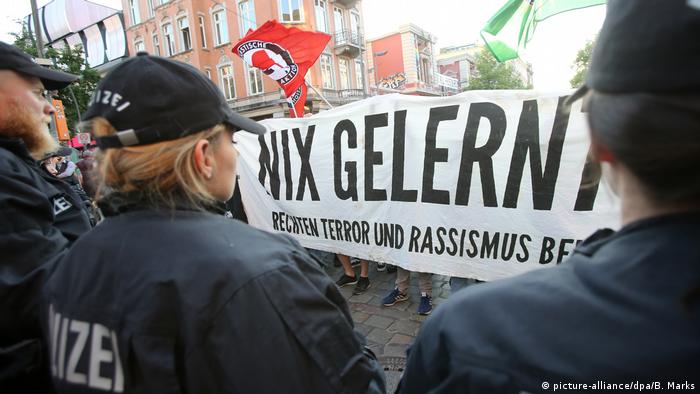
As riots triggered by the death of George Floyd spread across the US, many activists in Germany want the police to face its own accusations of racist violence. Several people of color have been killed by police or died in custody in the last 20 years — the most well-known being Sierra Leonean asylum-seeker Oury Jalloh, whose burned body was found in a police cell in Dessau in 2005.
And there have been many others: From Cameroonian asylum-seeker Achidi John, who died after being forced to take emetics, a drug that causes vomiting, while in custody in Hamburg in 2001, to Hussam Hussein, an Iraqi refugee who was shot dead outside a refugee home in Berlin in 2016.
Read more: Germany battles over the N-word
Everyday experience
These cases might have scandalized many, but for black people in Germany they are simply deadly examples of racial profiling they face every day, even though that has long been officially banned. "The African community has never had the experience that the police is there to protect them," said Sylvie Nantcha, founder and head of The African Network of Germany (TANG). "Rather they have the impression that the police is there to suspect them."

Sylvie Nantcha is a member of the CDU
Nantcha, a member of Angela Merkel's Christian Democratic Union (CDU) party and once the first African German city council member in the southern city of Freiburg, has heard countless stories of racial profiling from members of her organization.
"We know that our people are checked by the police more than they should be," she said. "The other day a colleague of mine said he was on a train and the police walked past a hundred people and stopped by him and asked for his ID. It happens every day." But the police do not keep official records of these incidents, which means, Nantcha added, the issue is never properly assessed.
That was confirmed by Sebastian Bickerich, spokesman for the German government's Anti-Discrimination Agency, who said the country lacked both "systematic gathering of racial profiling cases and clearly defined jurisdictions and complaint structures."
Read more: What's life really like for black people in Germany?
'Rotten apples' or endemic problem

Asylum-seeker Oury Jalloh died in a prison cell in 2005
Day-to-day policing in Germany is the responsibility of the states, each of which have their own recruitment and training programs, as well as their own laws. Some — mainly in the western German states — have already made an effort to recruit more people of immigrant background into the force.
Berlin, for its part, has just passed a new anti-discrimination law that covers all state authorities including the police, and which for the first time allows people to sue for compensation if they are discriminated against.
But the federal government still appears to have a blind spot about racial profiling. At a press conference this week, Federal Interior Ministry spokesman Steve Alter, while acknowledging that the police do not collect numbers, insisted racial profiling is not a problem in the police force "as a whole." "These are, to my knowledge, individual cases, when measured against the size of the organization," he told a Deutschlandfunk public radio reporter. "Nevertheless, every individual case is taken seriously and included in the structural reappraisal."
The police unions, which like to make more politicized statements on policing, are defensive about suggestions of endemic racism in the ranks. Jörg Radek, deputy chairman of the GdP police union, told the Tagesspiegel newspaper on Wednesday that anyone accusing the German police of "latent or structural racism" was either "showing serious gaps in their knowledge about how the police works, or is trying, from the point of view of the GdP, to exploit the measured response of forces for party political purposes."
Read more: German authorities' many failures in investigating the NSU

But despite resistance from the unions, Rafael Behr, a former police officer and now a professor at the Hamburg Police Academy, said the police itself was shifting its perception away from the "rotten apples" argument. "Because these individual cases have indeed mounted up so much that there are more and more concerns about where the structural or institutional conditions are that might support those cases," he told DW.
"I wouldn't say that the German police are institutionally racist, but I would say that there are structural and institutional conditions that don't stop racism," he argued. "And not bringing up this issue was until now the biggest shortcoming of Germany's police leadership."
'Racist human rights violations'
The Interior Ministry also pointed to official complaint channels about police action — but black activist groups have argued for years that these are themselves biased.
"State prosecutors tend to believe the police, rather than private citizens," Tahir Della, spokesman for the Initiative of Black People in Germany (ISD), told DW. "We need legal leverage. We need independent complaint structures where we can intervene, and where people can be called to account. We need protection from racist human-rights violations. At the moment I have to complain about the police to the police." This is the gap that the new Berlin law is meant to close — and it has already been welcomed by activist groups and is being vehemently opposed by the GdP police union.
Read more: Berlin police recruits must 'learn German before English'
But for Della, it would only be a vital first step, which would allow Germany to address the larger issue: how the police is educated.
That is Rafael Behr's job at the Hamburg Police Academy. He doesn't believe the police attract a disproportionate number of racists among new recruits, but he does think the three-year training that cadets go through needs to include more political and anti-discrimination training — and that should continue later. "We let them out of the academies and leave them to practical experience that we can no longer control," he said. "That's the big gap — there should be a continuation of education during the practical experience, maybe through feedback groups or supervision groups."
Some police forces, such as in Saxony-Anhalt, the state where Oury Jalloh died, say they now explicitly address "prejudice-led attitudes and actions" by police officers and the "related flawed culture" in the force during training.
For Sylvie Nantcha, meanwhile, structural racism in the police is just part of a bigger societal problem. "We Africans have a second generation of people here now," said Nantcha. "They're Germans. They don't have any other home. They just want to be recognized as part of this country. That's their simple demand."
DW RECOMMENDS
US companies stand up for racial justice
Since the killing of George Floyd and the eruption of mass protests across the US, companies have begun expressing solidarity with the Black Lives Matter movement. Critics have accused them of jumping on the bandwagon. (04.06.2020)
Bayern Munich's Jerome Boateng: 'No child is born a racist'
Following the killing of George Floyd, Bundesliga players have spoken out against racism. German footballer Jerome Boateng talked to DW about the importance of education and the room for more support. (04.06.2020)
Carnival party in Bavaria sparks racism debate in Germany
A charity ball in a Bavarian village has launched a debate in Germany over the use of a derogatory term for black people. Locals have defended it as "a normal term" in Bavaria's dialect, while critics say it's offensive. (23.02.2017)
Should books with racist content be revised?
While somtimes only simple textual changes are needed to update a classic, removing racist slurs does not always eliminate ideologies of the past. Here are some examples that show how revising books is a delicate affair. (10.04.2018)
Date 05.06.2020
Author Ben Knight
Related Subjects Discrimination
Keywords racism, George Floyd, police, discrimination
Permalink https://p.dw.com/p/3dIgi
How US police avoid scrutiny and keep power
In recent decades, police in the United States have amassed significant power through laws that grant them a high level of immunity, a lack of oversight, big budgets and a focus on reforms that bring little change.
The most recent budget proposal for the city of Los Angeles sparked a flood of social media outrage. Mayor Eric Garcetti wanted to increase the amount of money allocated to the police, raising it to more than $1.85 billion (€1.64 billion), out of a total budget of $5.46 billion — the highest amount allocated to any department. As a comparison, the Housing and Community Investment department would receive less than $82 million if the budget was approved.
Garcetti has since promised to shift some of the funds to community initiatives but the amount allotted to law enforcement is still sizable. And Los Angeles is no exception — big budgets for police departments are common in US cities.
According to Stuart Schrader, a sociologist at Johns Hopkins University, big police budgets are rooted in lobbying efforts that first peaked in the 1990s: "Not only was the International Association of Chiefs of Police (IACP) trying to shape anti-crime legislation, it was trying to make elected officials accountable to police, rather than the other way around," Schrader wrote in a 2019 essay titled "To Protect and Serve Themselves: Police in US Politics since the 1960s."
With decreasing crime rates over the years, Schrader argues that police departments could scale back in many areas of the country. Instead, "rather than allow these capacities to evaporate, police protect them," Schrader writes. "Police have become unwilling to let go of their competitively realized gains, placing their self-interested advocacy at an increasing distance from achieving their nominal mission of crime control."

The movement to defund or abolish the police is gaining steam in the US
The call for abolishing police
Now, the movement calling for defunding and ultimately abolishing police in the US altogether is gaining momentum. Ralikh Hayes, co-founder of Organizing Black, is advocating for funds now being poured into police departments to be used differently. He told DW that cities should fund "the creative process to experiment with other ideas of what safety looks like and invest in the things that we know people need. Because we know crime is typically caused by not having the resources that they need."
"As you can see in communities all across America, when there's not a police officer in sight, those communities are considered perfectly safe," Hayes said. "But why is it that our communities that are full of police are not considered safe?"
Another way the police have leverage over preserving the status quo is keeping evidence and data confidential. Compiling data on interactions between the police for research purposes can be difficult, said Alyasah Sewell, professor of sociology at Emory University in Atlanta, Georgia.
Researchers and citizen-led initiatives often have to rely on news reports. Sewell noted that statistics released by law enforcement agencies sometimes lack information — such as race or gender — about the persons involved in a particular encounter. "We rely on police to tell us what happened," Sewell told DW.
Police reform can only do so much
The research that has been done often focuses on reform efforts. Many experts have concluded that measures such as anti-bias training or wearing body cameras have little effect on the decisions police officers make. A Yale study from 2017 found that body-worn cameras have "statistically insignificant effects on police use of force and civilian complaints, as well as other policing activities and judicial outcomes."

Experts say body cameras have little effect on police decisionmaking
Police officers who kill unarmed citizens or use violence against citizens often face few or no consequences, said Niesha McCoy, a member of the Baltimore County Justice Coalition. The group is seeking to establish a model of civilian oversight to hold police in their community accountable. "Police officers have so-called qualified immunity and in some cases of misconduct, officers are merely transferred from one department to another," McCoy said. The qualified immunity doctrine protects police officers from liability when they are accused of violating a person's rights.
Is the individual racist, or society?
When a white police officer kills an unarmed black person, this officer is often referred to as a "bad apple" by colleagues, politicians and the public alike. The term implies the officer in question doesn't represent a bigger problem, but is simply a poorly-behaved individual acting in a rare event.
National security advisor Robert O'Brien took this line on CNN this week, when he was interviewed about the killing of George Floyd, a black man who died in Minneapolis while a white officer was kneeling on his neck and three of his colleagues watched.
"I don't think there is systemic racism," said O'Brien. "I think 99.9% of our law enforcement officers are great Americans. But you know what, there are some bad apples
Sociologist Alyasah Sewell
Sociologist Alyasah Sewell disagrees and believes it is not enough to focus on individual police officers. "A bad cop is a bad seed," she said. "It creates a system of networks that support it. If you cut through an apple you don't get to the seed until you are halfway through the apple. But if that seed is rotten everything you cut through is living off of that infection."
History lives on in today's police agencies, according to Sewell, whose research focuses on structural racism. "You reallydisagrees and believes it is not enough to focus on individual police officers. "A bad cop is a bad seed," she said. "It creates a system of networks that support it. If you cut through an apple you don't get to the seed until you are halfway through the apple. But if that seed is rotten everything you cut through is living off of that infection."
History lives on in today's p agencies, according to Sewell, whose research focuses on structural racism. "You really have to go back to slavery," they said. "Slave patrols evolved into what police are today. The police think black and brown people are criminals just by looking at them. And once you call someone a criminal, you have the right to remove them from society."
Violence from federal and state agencies is not only tolerated, some say it is encouraged by the president himself. At the beginning of the week, Donald Trump told governors that their response to the ongoing protests had been weak. "If you don't dominate, you are wasting your time. They are going to run you over. You are going to look like a bunch of jerks. You have to dominate," Trump said.
Date 06.06.2020
Author Julia Mahncke
Keywords USA, police, racism, violence, abuse, power
Permalink https://p.dw.com/p/3dLFE
Racism in Brazil: The death of a five-year-old
In the midst of the coronavirus pandemic, Brazil is experiencing its own version of "Black Lives Matter." The death of a five-year-old black boy in Recife has reignited the discussion about racism in the country.

"While the #blacklivesmatter hashtag does the rounds of social media, here in Brazil we've lost another black child because of the deeply rooted racism in our society," writes the historian Larissa Ibúmi. "These are still the same colonial structures that degrade black women to the servants of white mistresses."
Ibúmi was responding to the death of Miguel Otávio Santana da Silva, a tragic incident that occurred on June 3 in Recife, capital of the Brazilian state of Pernambuco. Mirtes Renata Souza, a domestic servant, arrived for work on the fifth floor of a luxurious condominium. Schools were closed due to coronavirus measures, so she brought her five-year-old son Miguel Otávio Santana da Silva with her.
Souza then took the dog out for a walk, as instructed by her employer, Sarí Gaspar Côrte Real, leaving her son behind in the apartment. But the boy wanted to follow his mother, and Côrte Real let him take the elevator by himself.
Read more: Coronavirus: Brazil headed for catastrophe
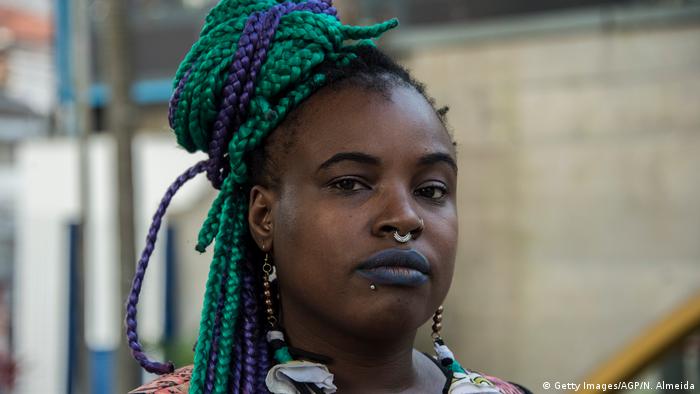
Rapper Joyce Fernandes has started a campaign for housemaids to report employers' abuse
Accusation of manslaughter
The condominium's security camera footage shows that the boy got out of the elevator on the ninth floor, and climbed through a window onto a balcony railing. Shortly afterwards, he fell to his death. His mother's employer has been charged with manslaughter by criminal negligence – and is already free on bail of €3,450 ($3,900).
In an interview with Brazilian TV station Globo, Miguel's mother said, "My employer often entrusted her children to me. Unfortunately, in the moment when I entrusted her with my son, she didn't have the patience to look after him and get him out of the elevator."
Miguel was Mirtes Renata Souza's only child. After his death, social networks were flooded with expressions not only of grief and shock but also of hatred and anger. Politicians and activists from all over Brazil posted comments with the hashtag #justicapormiguel (Justice for Miguel). An online petition got more than 680,000 signatures in less than 24 hours.
The pop singer IZA commented on her Twitter account, which has 2.5 million followers: "Unfortunately, the story of Miguel is a real-life tragedy. While Mirtes, his mother, endures the worst possible pain, Sarí, the boss, pays bail and is free to return home. What if it were the other way around?"
'Cursed upper class'
The rapper, writer and activist Joyce Fernandes wrote on Facebook and Instagram: "A young life was ended by this cursed elitist white and decadent upper class that buys everything with money they inherited from the masters who enslaved my ancestors."
Fernandes, who performs in Brazil under the stage name "Preta rara" (Rare Black), is revered by millions of black Brazilian women. Until 2009, she too was a domestic worker. She started the Facebook page "Eu, empregada doméstica" (I, a domestic worker), wrote a book of the same name, and the activist is now a frequent guest on TV shows.
Meanwhile, a statement from the National Federation of Domestic Workers (FENATRAD) emphasized the negligence of the employer, Sarí Gaspar Côrte Real: "It is typical of the contempt for and objectification of the lives of black Brazilians. This says a lot about our country, the legacy of slavery, and the racism that has not been overcome."
Only seven years ago, on June 1, 2013, a law came into force in Brazil that put domestic workers on the same legal footing as other employees for the first time: the so-called "PEC das empregadas." Until then, domestic workers were considered "second-class" employees, who could not, for example, claim overtime or unemployment benefits.
Read more: Opinion: White privilege and the responsibility to enact change
Coronavirus and Brazil's class-based society
Yet despite achieving equality in law, discrimination against domestic workers in Brazil continues in practice. That has become particularly apparent during the coronavirus crisis.
The first victim of COVID-19 in Rio de Janeiro was a domestic worker: The 63-year-old diabetic Cleonice Gonçalves, who caught the virus from her employer, who had become infected on holiday in Italy in March. The employer was tested after her return, but she didn't tell her housekeeper that the test had been positive. Gonçalves died on March 19 in hospital in a suburb of Rio.
Mirtes Renata Souza's employers also caught the coronavirus. Sérgio Hacker, Sarí Gaspar Côrte Real's husband, is the mayor of a town near Recife. In a selfie video recorded on April 22, he explained that he and his wife had tested positive for COVID-19. Yet, despite this, their housekeeper was still required to come in for work.
Many Brazilians doubt that the couple will really be held accountable. "We should be under no illusions," tweeted Túlio Gadêlha, a lawyer and federal deputy for the state of Pernambuco, representing the Democratic Labour Party (PDT) in the national parliament in Brasília. "The Côrte Real/Hacker family have a lot of political power and influence in Pernambuco. It will become clear that Pernambuco is still ruled by oligarchs."
For Marcos García, a reader of the daily newspaper Folha de S.Paulo, the tragedy of Miguel reveals Brazil's latent racism: "If the son of a white employer had died, the domestic worker would already be behind bars and reviled online," he said. "What a brutal country!"DW RECOMMENDS
Brazil: Bolsonaro orders security forces to intervene in pro-democracy protests
Anti-government protesters are "outcasts, delinquents, and addicts," according to the Brazilian president. Jair Bolsonaro has threatened to call on security forces for an upcoming pro-democracy protest over the weekend. (05.06.2020)
Date 06.06.2020
Author Astrid Prange
Related Subjects Brazil, Coronavirus
Keywords coronavirus, Brazil, racism, Black Lives Matter
Permalink https://p.dw.com/p/3dMFi
Anti-government protesters are "outcasts, delinquents, and addicts," according to the Brazilian president. Jair Bolsonaro has threatened to call on security forces for an upcoming pro-democracy protest over the weekend. (05.06.2020)
Date 06.06.2020
Author Astrid Prange
Related Subjects Brazil, Coronavirus
Keywords coronavirus, Brazil, racism, Black Lives Matter
Permalink https://p.dw.com/p/3dMFi

SPLASHING ABOUT IN THE COAL PIT
From mining to tourism
In the days of the former East Germany, more than 65,000 miners were employed in Lausatia's coal mining sector. Thousands lost their jobs when mines shut down in the 1990s. To compensate, the region decided to boost its tourism sector, and the transformation has been ongoing ever since. Almost 37,000 acres of land ravaged by mining will eventually become Europe's biggest water playground.
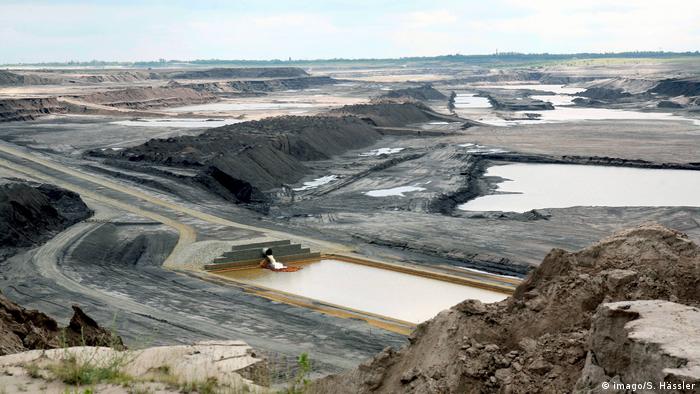
SPLASHING ABOUT IN THE COAL PIT
Total transformation
Today, this former open-pit mine is the site of Lake Senftenberg. It is surrounded by 7 kilometers of sandy beaches and lawns for sunbathing. The East German energy sector relied heavily on brown coal. But after reunification in 1990, dozens of coal pits were shut down. This lake actually formed after the mine started flooding in 1967 and the first 'beach section' was commissioned in 1972.

SPLASHING ABOUT IN THE COAL PIT
Water, water, everywhere
Water, water, everywhere
Lake Geierswald and Lake Partwitz are just two of the 25 pit lakes in the area of Lausatia that spans the state borders of Brandenburg and Saxony. To keep their levels steady, water from the rivers Spree, Lusatian Neisse and Black Elster flow into the former mines. Without the artificial flooding, it would take 80 to 100 years to fill a pit naturally with rain and groundwater.

SPLASHING ABOUT IN THE COAL PIT
Taste of the mines
Johanniter or Pinotin? Cornelia Wobar grows both grape varieties on the only steep slope in Brandenburg, above the former open-cast mine that is now Lake Grossräschen. Wine experts say Brandenburg's intensely acidic soils have excellent potential for viticulture. The first wine produced from grapes grown on a former strip mine hit the market in 2008.

SPLASHING ABOUT IN THE COAL PIT
Almost like the Caribbean
The glowing turquoise color of Lake Partwitz comes from quicklime added to the waters to neutralize acidity — a legacy of the mines. As a result, there is little plant and animal life, but the lake is safe for swimmers. Lake Partwitz was built on the former lignite mine at Geierswalde, a village in Lower Lusatia, and was fully flooded in 2015.
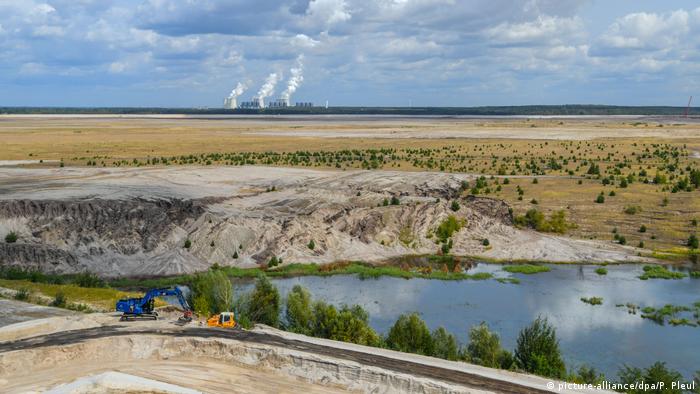
SPLASHING ABOUT IN THE COAL PIT
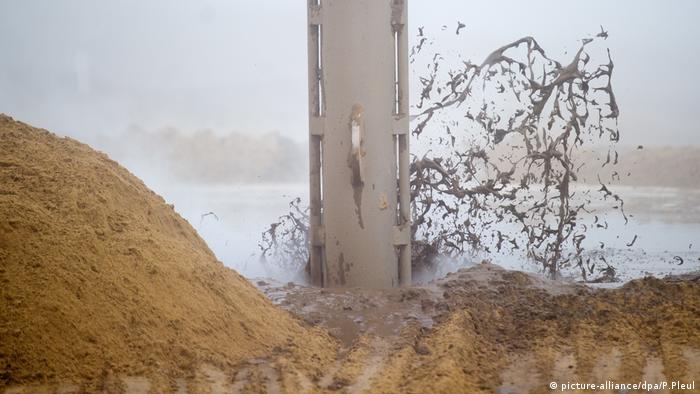
SPLASHING ABOUT IN THE COAL PIT
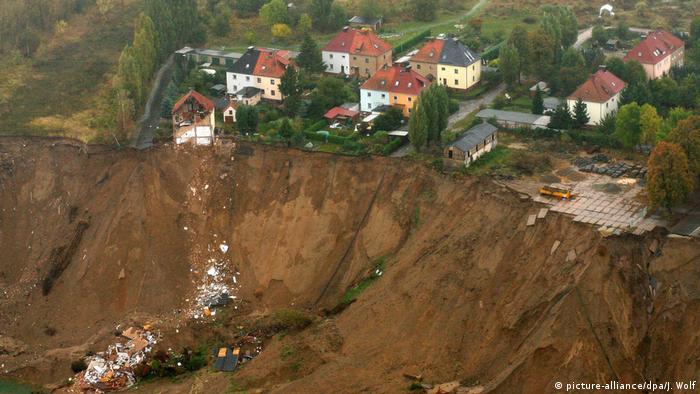
SPLASHING ABOUT IN THE COAL PIT

SPLASHING ABOUT IN THE COAL PIT
A renewable future?
Greenpeace Energy has another vision for the former coalfields. As of 2020, it wants to buy open-cast mines from the RWE Group, shut them down by 2025 and build large-scale renewable energy plants that would generate roughly a quarter of the power RWE currently produces in the Rhineland mining region. To date, RWE has not agreed to sell its land.
Author: Theresa Krinninger
The end of black coal mining in Germany
https://www.dw.com/overlay/media/en/the-end-of-black-coal-mining-in-germany/46824749/53686045
After more than 150 years, the industrial mining of black coal in Germany is coming to an end with the closure of the Prosper-Haniel mine in Bottrop. It marks the sad finish to an era of black gold in the Ruhr Valley. (21.12.2018)

SPLASHING ABOUT IN THE COAL PIT
Almost like the Caribbean
The glowing turquoise color of Lake Partwitz comes from quicklime added to the waters to neutralize acidity — a legacy of the mines. As a result, there is little plant and animal life, but the lake is safe for swimmers. Lake Partwitz was built on the former lignite mine at Geierswalde, a village in Lower Lusatia, and was fully flooded in 2015.

SPLASHING ABOUT IN THE COAL PIT
Germany's biggest swimming lake
In early 2019, the energy group LEAG began flooding Lake Ostsee near Cottbus. Altogether, a million cubic meters of water will have to be added before the lake opens to the public. That's supposed to happen by 2025. LEAG had to stop its first trial flooding in 2018 after an exceptionally dry summer; the Spree River water levels were too low.

SPLASHING ABOUT IN THE COAL PIT
Preparing the ground
Turning a former coal pit into a lake isn't as simple as just opening the floodgates. First, loose soil needs to be compressed to avoid the risk of landslides. Special vibro-compression technology, like this soil compactor working the former surface mine in Jänschwalde, near the city of Cottbus, are put into action.

SPLASHING ABOUT IN THE COAL PIT
Disaster in Nachterstedt
Without proper precautions, disaster can strike. On July 18, 2009, a massive landslide on the southern shore of Lake Concordia in central Germany carried three houses away, killing three people. An investigation found that high pressure in the aquifer, combined with loose dump material underwater, were to blame for the accident. The area is still being redeveloped.

SPLASHING ABOUT IN THE COAL PIT
A renewable future?
Greenpeace Energy has another vision for the former coalfields. As of 2020, it wants to buy open-cast mines from the RWE Group, shut them down by 2025 and build large-scale renewable energy plants that would generate roughly a quarter of the power RWE currently produces in the Rhineland mining region. To date, RWE has not agreed to sell its land.
Author: Theresa Krinninger
The end of black coal mining in Germany
https://www.dw.com/overlay/media/en/the-end-of-black-coal-mining-in-germany/46824749/53686045
After more than 150 years, the industrial mining of black coal in Germany is coming to an end with the closure of the Prosper-Haniel mine in Bottrop. It marks the sad finish to an era of black gold in the Ruhr Valley. (21.12.2018)
Subscribe to:
Comments (Atom)

